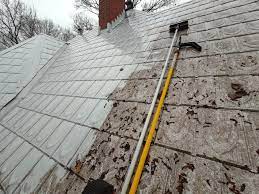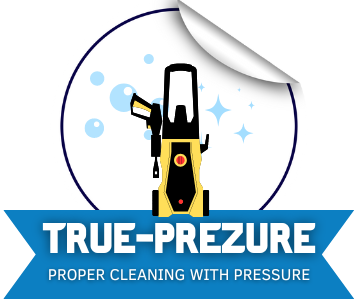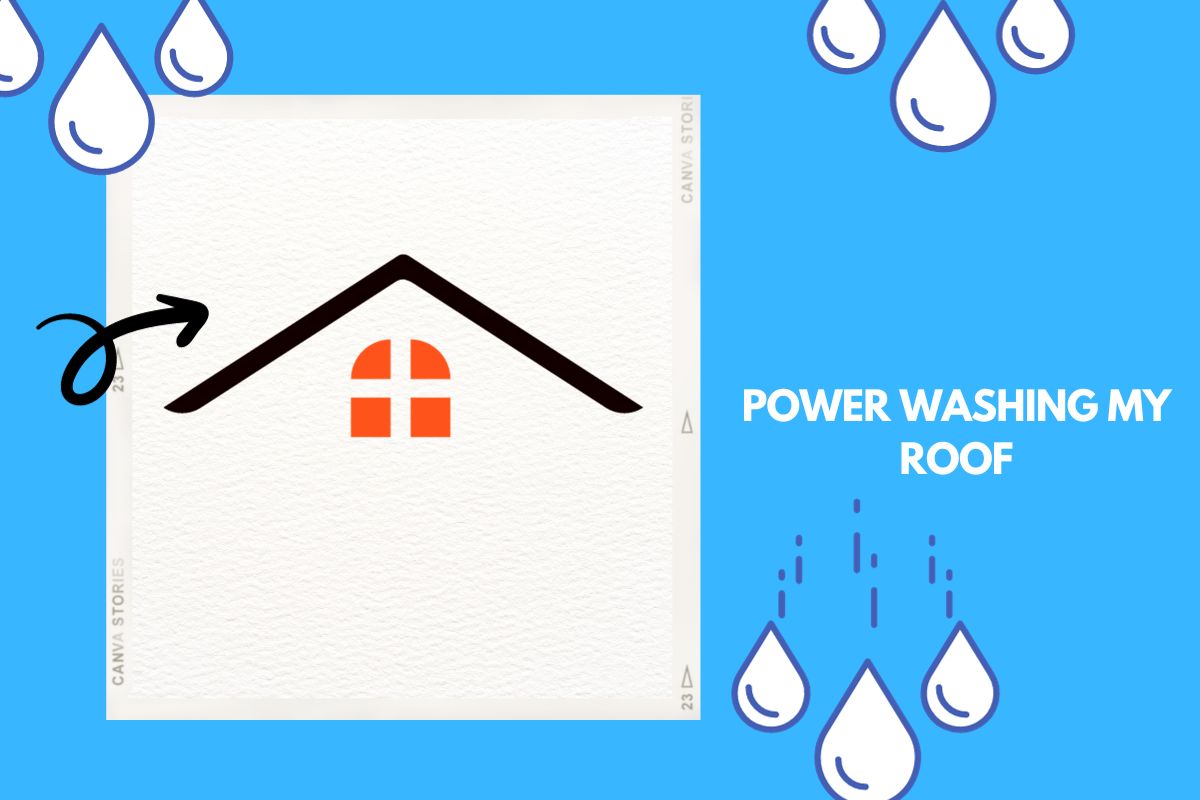Are you tired of looking at your dirty and stained roof?
Do you wish there was a solution to restore its original shine and beauty? If so, power washing might be the answer. Power washing is a popular method for cleaning roofs,
but many homeowners are skeptical about its safety for their shingles. In this blog post,
we’ll explore the benefits of power washing your roof, best practices for getting it washed, alternative ways to clean it if pressure washing isn’t for you, and whether or not it’s a necessity. So sit back and relax as we dive into the world of roof cleaning!
CONCERNS ABOUT PRESSURE WASHING YOUR ROOF
When it comes to cleaning your roof, there are several concerns you might have about using a pressure washer. For starters, the high-pressure water stream could damage the shingles or tiles on your roof. This is a legitimate concern as some roof materials can be more fragile than others and may not withstand the force of a power washer.
Another concern is that water could seep into your home through gaps or cracks in the roof caused by pressure washing. While this is less likely to happen if you hire an experienced professional who knows how to avoid these issues, it’s still worth considering.
Additionally, pressure washing can dislodge debris that has been sitting on top of your roof for years. While this might seem like a good thing at first glance, it could also lead to clogged gutters and downspouts which can cause even bigger problems down the road.
There’s also the risk of injury if you attempt to pressure wash your own roof without proper training or equipment. Climbing up on a ladder with heavy machinery puts you at risk for falls and other accidents.
All things considered, while there are certainly concerns associated with pressure washing your roof, many homeowners find that it’s still worth doing when done properly by professionals who know what they’re doing!
CAN YOU CLEAN A ROOF WITH A PRESSURE WASHER?

Pressure washing has become a common method for cleaning roofs, especially since it is an effective and efficient way to remove dirt, debris and algae. However, some homeowners are hesitant about using this technique due to the fear of damaging their roof shingles.
The truth is that pressure washing can be used on certain types of roofs, particularly those made out of asphalt or metal. These materials can withstand the force of a pressure washer without being damaged as long as they are in good condition.
To ensure safety and avoid causing any damage to your roof, it’s important to use the appropriate equipment with proper settings. A pressure washer with at least 3,000 PSI should suffice but never go beyond that level. Additionally, you should choose a fan tip nozzle instead of a pinpoint one which will prevent tearing off shingle granules or denting metal sheets.
When done correctly by professionals trained in roof cleaning techniques like Soft Wash Systems™ (SWS), power washing your roofing system will improve its overall appearance and increase its lifespan while saving thousands compared to replacing them altogether!
WHAT ARE THE BENEFITS OF POWER WASHING?
Power washing is a great way to deeply clean your roof, making it look like new again. One of the main benefits of power washing is that it can remove years of dirt, grime, and other debris that has built up on your shingles. This can help improve the overall appearance of your home.
Another benefit of power washing is that it can help prevent damage to your roof over time. By removing things like moss or algae growth from the surface, you are reducing the risk of damage to the underlying materials.
In addition to these benefits, power washing can also help increase the lifespan of your roof by removing harmful substances that could cause deterioration over time.
Furthermore, having a clean roof improves energy efficiency in homes as well! A dirty roof often leads to heat absorption which means more money spent on cooling costs during summers. Powerwashing helps keep this problem at bay!
Getting regular power washes for your roof provides numerous advantages such as enhancing curb appeal and helping maintain its structural integrity long-term!
BEST PRACTICES FOR GETTING YOUR ROOF WASHED
When it comes to washing your roof, there are some best practices that you should follow to ensure a safe and effective cleaning process. Here are some tips:
Firstly, make sure you hire a professional who has experience in power washing roofs. This will ensure the job is done safely and effectively.
Secondly, before starting the power washing process, inspect your roof for any damage or loose tiles. If there is any damage present, it’s important to fix it before proceeding with the wash.
Thirdly, cover any delicate plants or shrubs surrounding your home with plastic sheeting to protect them from detergent runoff during the cleaning process.
Fourthly, use appropriate safety gear like non-slip shoes and safety goggles when climbing onto your roof or operating pressure washer equipment.
Be mindful of using an appropriate amount of water pressure as excessive force can cause damage to shingles. A professional cleaner will know how much pressure is required depending on the type of roofing material being cleaned.
WHAT IS THE BEST TIME OF YEAR TO HAVE YOUR ROOF CLEANED?
The best time of year to have your roof cleaned depends on where you live and the climate conditions in your area. Generally speaking, it’s recommended to have your roof cleaned in spring or fall when temperatures are mild and there’s less chance of extreme weather conditions.
In areas with a lot of rainfall, it may be best to wait until after the rainy season before scheduling a cleaning appointment. This will ensure that any debris or dirt washed off during the cleaning process won’t clog gutters or drains, causing potential damage to your home.
On the other hand, if you live in an area prone to ice and snow accumulation during winter months, it may be beneficial to schedule a cleaning before winter hits. This will prevent any buildup from adding unnecessary weight to your roof which can lead to leaks or structural damage.
Ultimately, consult with a professional roofing contractor who can provide guidance specific for your location and needs. They’ll also be able to assess whether any repairs are necessary before proceeding with a cleaning job.
HOW OFTEN SHOULD YOU PRESSURE WASH YOUR ROOF?
It is important to keep your roof clean, but how often should you pressure wash it? The answer depends on a few factors.
Firstly, consider the climate where you live. If you live in an area with a lot of rain or humidity, your roof may grow algae and moss more quickly than a drier area. In this case, it may be necessary to pressure wash your roof once every year or two.
Another factor to consider is the type of roofing material. Some materials such as metal or concrete tiles are more durable and can withstand frequent pressure washing while others like asphalt shingles are more delicate and require less frequent washing.
Inspecting your roof regularly can help determine when it needs cleaning. If there’s noticeable buildup of debris like leaves or dirt that isn’t removed with routine maintenance then it might indicate that powerwashing is required.
There’s no hard-and-fast rule for how often you should pressure wash your roof – so use these factors as guidelines to make the best decision for your specific situation.
Reasons Why You Shouldn’t Pressure Wash Your Roof Shingles
While pressure washing can be an effective way to remove dirt, grime, and even some stains from your roof shingles, there are a few reasons why you should avoid this method.
Firstly, high-pressure water can easily damage the delicate shingle granules that protect your roof from UV rays and weathering. This can lead to premature aging of your roof and reduce its lifespan by several years.
Secondly, using a pressure washer incorrectly or at too close of range can also cause water to seep underneath the shingles and into the attic below. This not only causes potential leaks but also promotes mold growth in areas that may go unnoticed until it’s too late.
Certain types of roofing materials like slate or wood shake should never be cleaned with a power washer due to their fragile nature. In these cases, it’s best to opt for gentler cleaning methods such as soft washing or manual scrubbing.
While pressure washing may seem like an easy solution to dirty roofs, it has its downsides and risks damaging one of the most important parts of your home.
Reasons Why You Should Pressure Wash Your Roof Shingles
Are you tired of looking at a dirty and grimy roof? Pressure washing your shingles can help restore the appearance of your home. Not only does it improve curb appeal, but it also helps extend the lifespan of your roof by removing harmful debris.
Pressure washing can remove algae, moss, leaves and other contaminants that could potentially damage or clog up gutters leading to water accumulation which may eventually lead to leaks. By cleaning off these substances regularly, you’re reducing risk for future repairs.
Furthermore, pressure washing eliminates buildup on shingles that trap heat causing higher energy costs in warmer months. With cleaner roofs comes cooler homes allowing for less use of air conditioning throughout summer months thus conserving energy usage while saving money.
Pressure washing provides both aesthetic and practical benefits to homeowners with shingle roofs. It’s important to consider hiring professionals who have experience in safely conducting this process as improper technique may cause unnecessary damages such as cracks or breakage in tiles or puncturing membranes underneath roofing materials leading to leaks during rainfall which would defeat the purpose entirely!
Alternative Ways To Clean a Roof
If you’re hesitant about using a pressure washer to clean your roof, there are alternative methods that can be just as effective. One option is to use a chemical cleaning solution specifically designed for roofs. These solutions work by breaking down and removing dirt, grime, and algae without the need for high-pressure water.
Another method involves manually scrubbing the roof with a soft-bristle brush and soapy water. This approach can take more time and effort than using a pressure washer or chemical solution, but it’s also gentler on your shingles.
For those who prefer an eco-friendly approach, there are also non-toxic cleaning options available. Some companies offer environmentally friendly products made from natural ingredients like citrus extracts or hydrogen peroxide.
No matter which method you choose, it’s important to follow proper safety precautions when working on your roof. Always wear appropriate protective gear such as gloves, goggles, and slip-resistant shoes. And if you’re not comfortable doing the job yourself, consider hiring a professional roofing contractor who has experience with non-pressure washing methods.
Cleaning Roofs With Uncommon Shingles
Cleaning roofs with uncommon shingles can present unique challenges that require a different approach than traditional asphalt shingle roofs. For example, slate and tile roofs are more delicate and porous, which means they need to be treated with special care when cleaning.
Traditional pressure washing methods may not work for these types of roofs since too much pressure can damage the tiles or loosen them from the roof. For this reason, soft washing is often recommended for cleaning slate and tile roofs.
Soft washing uses low-pressure techniques combined with specialized cleaning solutions to safely remove dirt and grime without causing any damage to the roof’s surface. This method is also effective for removing moss, algae, and other organic material that tends to grow on these types of roofing materials.
When it comes to metal roofs, soft washing may not be necessary since they are typically more durable than other types of roofing materials. However, using too much pressure or harsh chemicals can still cause damage if not done correctly.
In general, it’s always best to consult with a professional roofer before attempting any type of roof cleaning on your own – especially if you have an uncommon type of shingle or roofing material. They will have the expertise needed to assess your specific situation and recommend the most appropriate course of action for keeping your roof clean and well-maintained over time.
faq-Does power washing damage roof shingles?
One of the frequently asked questions about power washing roofs is whether it will damage shingles. The answer is not a simple yes or no, as it depends on several factors.
Firstly, using too much pressure can indeed cause damage to shingles. However, a professional power washer will know how to adjust the pressure and use the appropriate nozzle for your specific roofing material.
Secondly, if your roof has pre-existing damage or weak spots, power washing could exacerbate these issues. It’s important to have any necessary repairs made before having your roof cleaned.
Additionally, some types of roofing materials are more delicate than others and may require alternative cleaning methods. For example, tile roofs should not be power washed at all as it can break tiles and cause leaks.
While there is potential for damage from power washing a roof with shingles, hiring a reputable professional who knows how to properly clean and protect your roofing material can minimize this risk.
What will damage asphalt shingles?
Asphalt shingles are a popular roofing material due to their affordability and durability. However, they can still be susceptible to damage if not properly maintained. Here are some factors that can damage asphalt shingles:
1. Weather: Extreme weather conditions such as strong winds, hailstorms, and heavy rainfalls can cause physical damage to your roof.
2. Poor ventilation: Inadequate ventilation in your attic or roof space can cause heat buildup which leads to the premature aging of shingles.
3. Moss and algae growth: These organisms thrive in damp environments and can loosen granules on the surface of your shingles, making them more prone to damage from weather elements.
4. Foot traffic: Walking on your roof for maintenance or repairs could lead to cracked or broken shingles.
5. Improper installation: If the installation is done incorrectly, it could result in poor alignment or insufficient nailing leading to loosening of shingles over time.
To prevent potential damage, have regular inspections conducted by a professional roofer who will identify any issues early on before they become major problems requiring costly repairs or replacement.
What are the benefits of pressure washing a roof?
In summary, pressure washing your roof can greatly benefit your home’s overall appearance and longevity. It effectively removes dirt, debris, and stains that can cause damage to your shingles over time. Additionally, power washing helps prevent the growth of mold and mildew which can be harmful to both your health and property.
By investing in a professional power washing service for your roof on a regular basis, you’ll not only keep it looking its best but also extend its lifespan. Just be sure to choose a reputable contractor who uses the right equipment and techniques for the type of shingles on your roof.
Remember that while there are some risks associated with pressure washing, they can be mitigated by following best practices such as avoiding high-pressure settings and using appropriate cleaning solutions.
If done correctly by an experienced technician, power washing is a safe and effective way to clean most types of roofs. So don’t hesitate to schedule this crucial maintenance task today!

